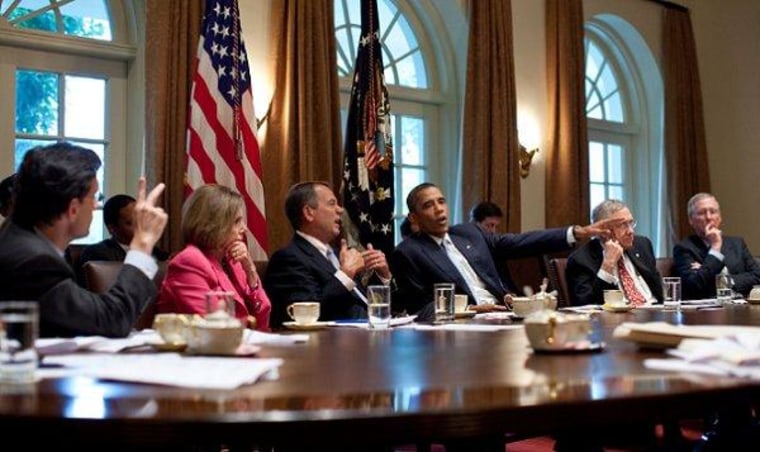Rules are rules. When it comes to the political establishment discussing what ails the American system, the rules dictate that "both sides" are always to blame for everything in all instances. Even if reality clearly shows one party more responsible than the other, no one's allowed to say so -- to assign responsibility to those who deserve it is to be biased and irresponsible.
With these rules in mind, it was a delightful surprise to see Tom Mann and Norm Ornstein publish a Washington Post op-ed over the weekend, headlined, "Let's just say it: The Republicans are the problem."
We have been studying Washington politics and Congress for more than 40 years, and never have we seen them this dysfunctional. In our past writings, we have criticized both parties when we believed it was warranted. Today, however, we have no choice but to acknowledge that the core of the problem lies with the Republican Party.The GOP has become an insurgent outlier in American politics. It is ideologically extreme; scornful of compromise; unmoved by conventional understanding of facts, evidence and science; and dismissive of the legitimacy of its political opposition.When one party moves this far from the mainstream, it makes it nearly impossible for the political system to deal constructively with the country's challenges."Both sides do it" or "There is plenty of blame to go around" are the traditional refuges for an American news media intent on proving its lack of bias, while political scientists prefer generality and neutrality when discussing partisan polarization. Many self-styled bipartisan groups, in their search for common ground, propose solutions that move both sides to the center, a strategy that is simply untenable when one side is so far out of reach.
For those unfamiliar with Mann and Ornstein, these aren't just two political scientists who occasionally write about current events. Mann and Ornstein enjoy almost unparalleled credibility with the Beltway establishment, and are generally accepted as centrist observers, not ideologues or partisan bomb-throwers.
This context matters. When Paul Krugman or Eugene Robinson says the radicalization of the Republican Party drives the dysfunction of our politics in the 21st century, they're correct, but the impact of perspective is limited. When Mann, a senior fellow at the Brookings Institution, and Ornstein, a resident scholar at the American Enterprise Institute, present the same argument, their observation raises eyebrows.
What's more, consider the real-world implications of the GOP's radicalism.
Many of the examples Mann and Ornstein rely on in their piece point to a modern Republican Party filled with intemperate children, throwing around reckless conspiracies, driving moderates from their midst, and rejecting their own ideas the moment Democrats think they have merit.
But the way in which the radicalization of the GOP affects modern policymaking cannot be overstated. A system designed to govern through compromise stops working when an entire political party refuses to make concessions. Policymakers have honored certain norms for generations, but once those norms have been abandoned -- filibustering every bill of any consequence, for example -- institutions begin to break down.
Former National Security Advisor Brent Scowcroft, who advised Presidents Gerald Ford and George H.W. Bush, told Fareed Zakaria yesterday that his Republican Party will eventually move back towards the middle, but I have no idea where his confidence comes from.
Indeed, Mann and Ornstein argued that the GOP is unlikely to become more responsible anytime soon.
If our democracy is to regain its health and vitality, the culture and ideological center of the Republican Party must change. In the short run, without a massive (and unlikely) across-the-board rejection of the GOP at the polls, that will not happen. If anything, Washington's ideological divide will probably grow after the 2012 elections.
Parties respond to electoral incentives. So long as Republicans become more extreme and keep winning elections, they'll see no reason to change.
As for the "rules" I mentioned at the outset, Mann and Ornstein offered the media some good advice: "We understand the values of mainstream journalists, including the effort to report both sides of a story. But a balanced treatment of an unbalanced phenomenon distorts reality.... Our advice to the press: Don't seek professional safety through the even-handed, unfiltered presentation of opposing views. Which politician is telling the truth? Who is taking hostages, at what risks and to what ends?"
